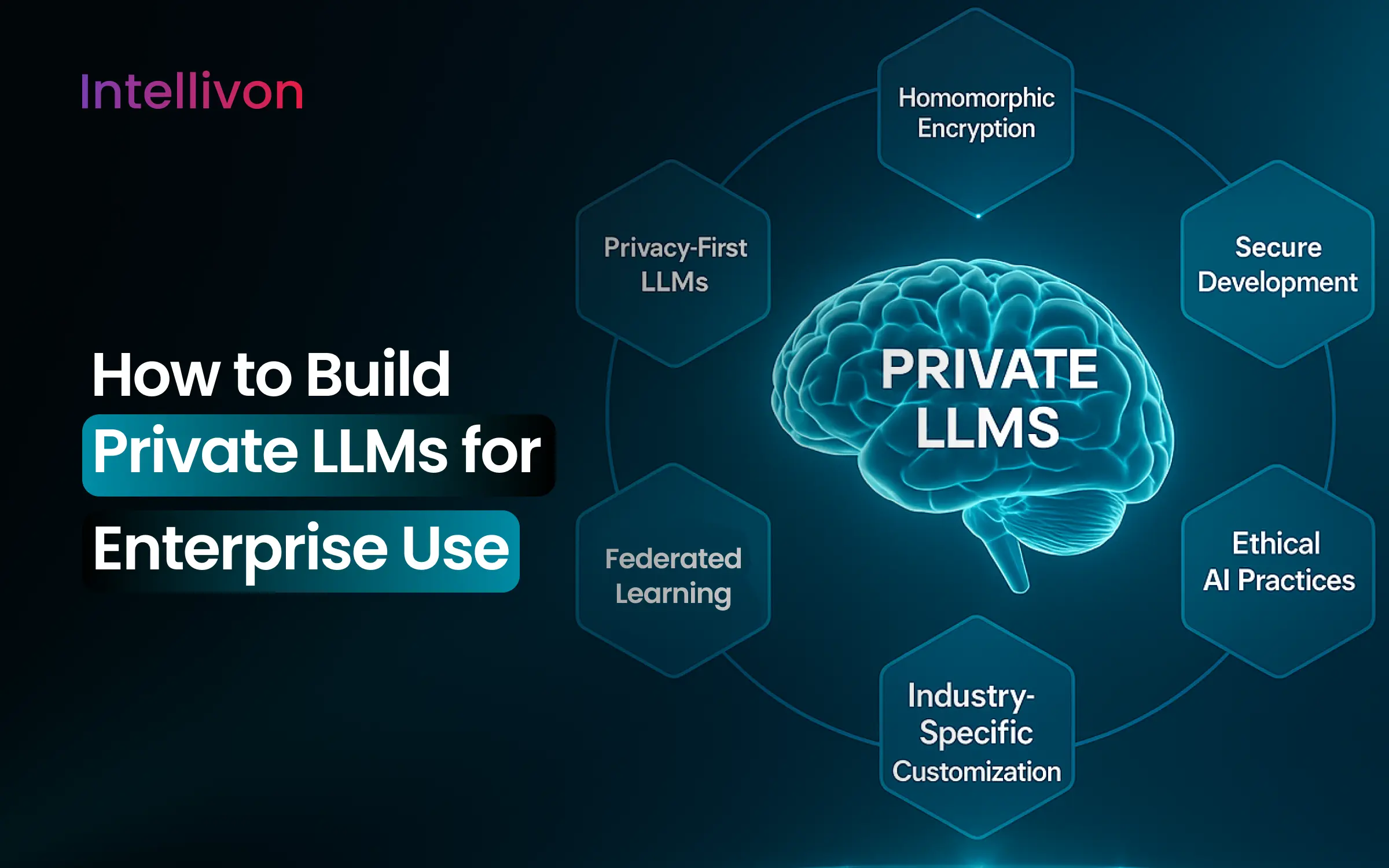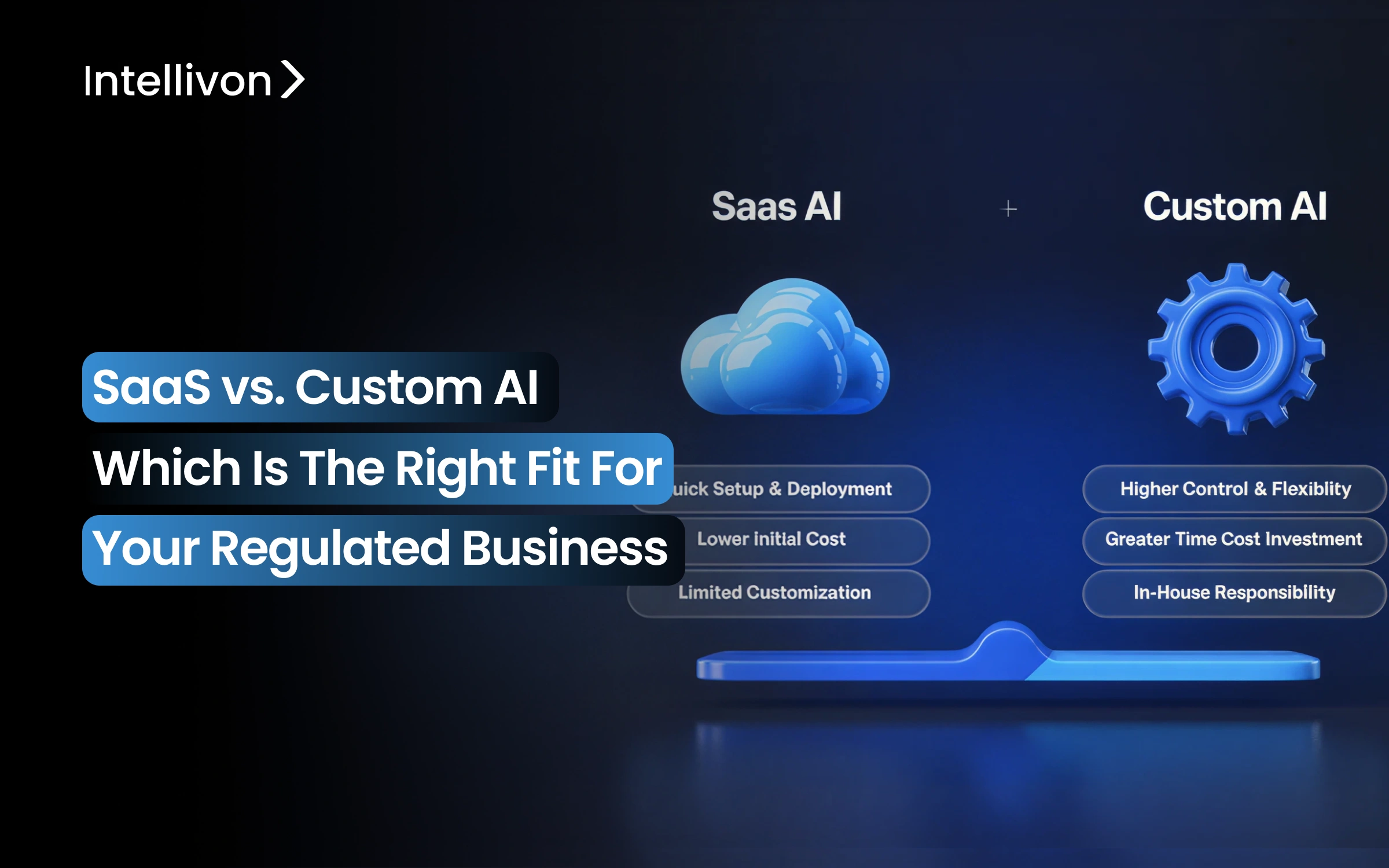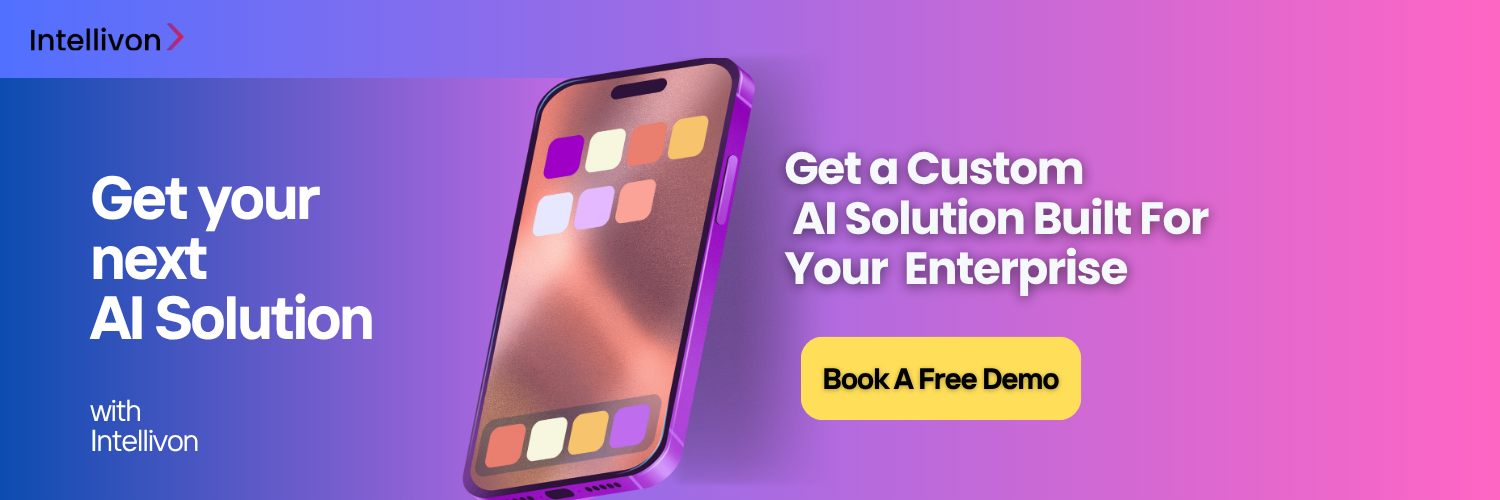AI is transforming the regulated enterprise landscape with precision-based analytics, streamlined customer regulation support, and proper handling of proprietary data. 78% of regulated companies worldwide are already using AI in at least one part of their business. The use of generative AI has nearly doubled, rising from 33% in 2023 to 71% in 2024.
However, enterprises in regulated industries still face a critical decision: Should they choose a Custom AI or a pre-built SaaS AI solution? Custom AI allows for tailored solutions that meet specific compliance and security requirements, while SaaS AI offers quicker deployment and lower upfront costs, but may not offer the same level of flexibility. Choosing the right solution depends on striking a balance between these trade-offs. According to Gartner (2024), companies that launch custom AI solutions see an average ROI of 55% over five years, compared to 42% for SaaS solutions in regulated and specialized industries.
Organizations need AI tools that not only meet regulatory standards but also ensure data integrity and long-term reliability. At Intellivon, our expert AI experts have delivered tailored AI solutions for regulated industries with a strong focus on compliance and security. With years of hands-on experience, we’re here to guide you in selecting the right AI solution for your enterprise. In this blog, we’ll help you choose the best option and explain how we develop custom AI solutions from the ground up for regulated sectors.
Understanding Regulated Industries and Why AI Compliance is Critical
Navigating the regulatory landscape is about protecting your business from potentially devastating penalties and reputational damage. Here’s what’s at stake for enterprises in regulated sectors:
GDPR (General Data Protection Regulation)
- Penalties: Fines up to €20 million or 4% of annual global turnover, whichever is higher. Even minor violations can trigger fines up to €10 million or 2% of global turnover.
- Key Facts: The largest fine to date is €1.2 billion, levied against Meta in 2023 for unlawful data practices.
- Consequence: Over €4.48 billion in fines have been issued in recent years, mostly for poor data handling.
HIPAA (Health Insurance Portability and Accountability Act)
- Penalties: Fines range from $141 to $71,162 per violation. The annual maximum fine for repeated offenses is $1.5 million.
- Enforcement: The Office for Civil Rights enforces mandatory reporting and investigates almost every reported breach.
- Consequence: Even minor lapses in patient data protection can result in costly investigations and significant fines.
FINRA (Financial Industry Regulatory Authority) & SOX (Sarbanes-Oxley Act)
- Penalties: Financial firms face large fines and legal action for compliance failures. Recent penalties include over $500,000 and a $12.5 million settlement for accounting violations.
- Consequence: Executives can face suspension, personal liability, or criminal prosecution for willful non-compliance.
CCPA (California Consumer Privacy Act)
- Penalties: Fines of $2,500 per unintentional violation and $7,500 per intentional violation. Consumers can also receive damages between $100 and $750 per breach.
- Consequence: Non-compliance or delays in breach notifications can lead to rapid legal actions.
The Cost of Non-Compliance
- Financial Impact: Studies show that non-compliance costs 2.7 times more than proactive compliance. This is due to escalating fines, productivity disruption, and expensive remediation efforts.
- Reputational Risk: High-profile breaches and record fines make headlines, leading to lost trust and customer attrition. The reputational damage often far outweighs the financial penalties.
As regulations tighten and evolve, businesses must adopt solutions that are built to meet regulatory standards. Investing in tailored AI and data management systems not only strengthens compliance but also helps mitigate risks and provides operational confidence.
Why AI Needs a Special Approach in Regulated Industries
Unlike other sectors, regulated industries can’t simply adopt a generic AI solution and hope for the best. The AI solutions deployed must be designed with specific compliance requirements in mind. For regulated enterprises, the adoption of AI needs to focus on three non-negotiable pillars of compliance:
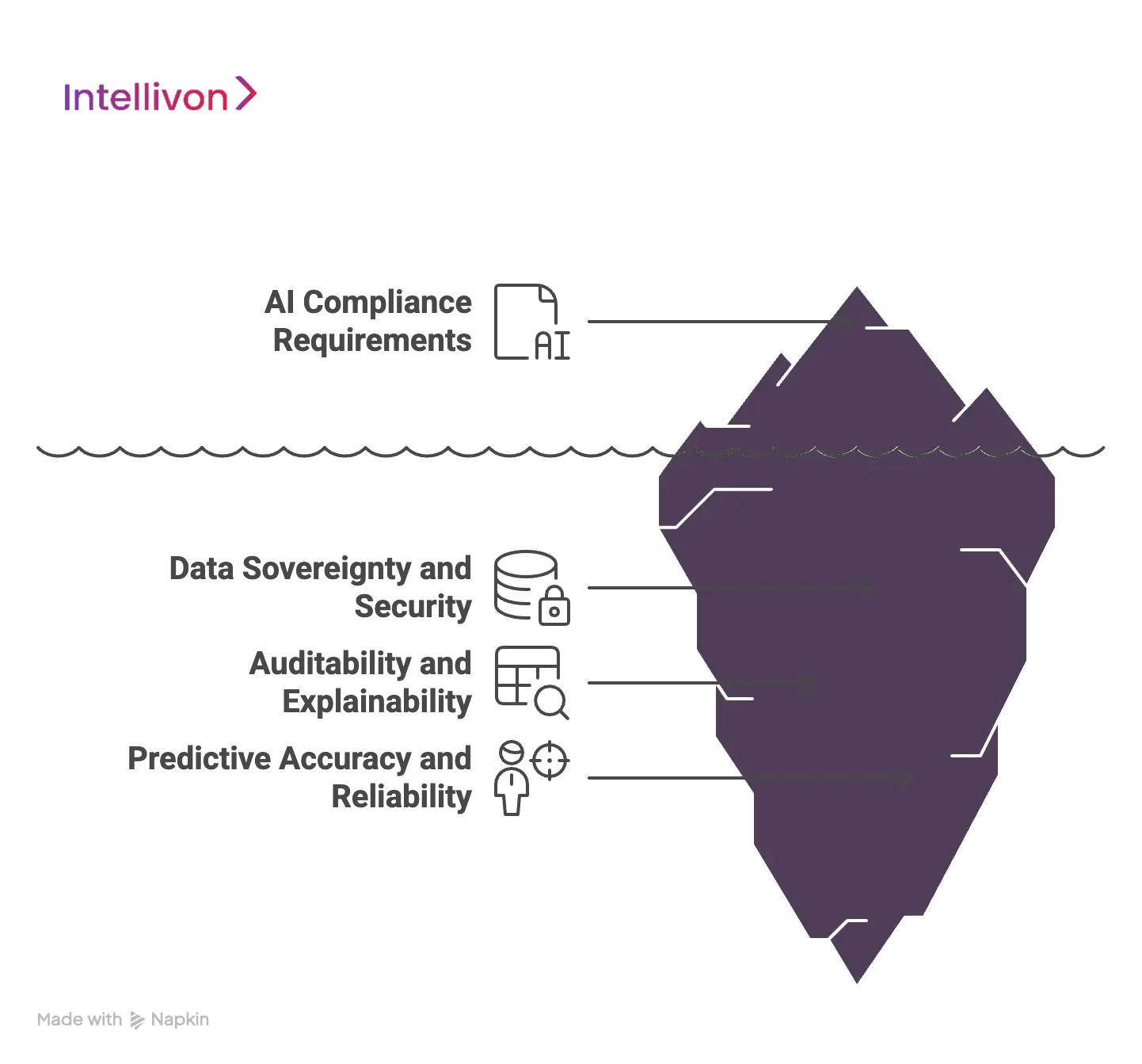
1. Data Sovereignty and Security
In regulated industries, businesses must have full control over their data. This means knowing exactly where your data is stored, who can access it, and how it’s used. In a SaaS environment, businesses risk losing this control, which can be dangerous. Can a vendor use your data to train their own models? Can you be confident that your sensitive data is isolated from other customers in a multi-tenant environment? Losing control over your data is a risk that cannot be taken in these sectors.
2. Auditability and Explainability (XAI)
Regulations like GDPR and laws governing the financial sector require that businesses be able to explain how AI makes decisions. If an AI denies a loan or flags a transaction for fraud, compliance officers need to trace the entire decision-making process. With black-box SaaS AI, this transparency is often unavailable. This lack of explainability can expose businesses to legal and regulatory risks.
3. Predictive Accuracy and Reliability
In regulated industries, AI models can’t just be “mostly right.” For example, an AI used in healthcare must provide reliable diagnoses based on rigorously trained models to avoid critical errors. Similarly, AI models in finance must be precise to minimize false positives in fraud detection. Generic AI models trained on broad datasets are not reliable enough for these high-stakes environments.
At Intellivon, we bake these three non-negotiable pillars of compliance into every layer of our AI solution. With this, we ensure your AI scales with your enterprise needs while keeping compliance, explainability, and accuracy intact.
Custom AI vs. SaaS: Understanding the Key Differences
When choosing an AI solution to implement for regulated industries, the decision often comes down to whether one should select a Custom AI or a SaaS AI solution. Both options have their benefits and drawbacks, but for businesses operating in regulated sectors, the stakes are high. Compliance, security, and reliability are non-negotiable factors in selecting the right solution.
Let’s explore the pros and cons of both Custom AI and SaaS AI to help you make an informed decision.
Pros of Custom AI Solutions
1. Full Compliance Control
Custom AI can be designed specifically to meet the unique compliance needs of regulated industries. From HIPAA in healthcare to GDPR in Europe, these AI solutions can be tailored to ensure strict adherence to all relevant laws and standards.
2. Enhanced Data Security
Custom AI gives businesses complete control over data storage, access, and security protocols. You can implement robust encryption and privacy measures, reducing the risk of data breaches.
3. Tailored to Specific Needs
Custom solutions can be fine-tuned to meet the precise needs of your business, ensuring that AI tools are effective and relevant to your specific operations, such as fraud detection in finance or diagnostic assistance in healthcare.
4. Better Auditability and Explainability
Custom AI solutions can be designed to provide full transparency and traceability in decision-making, ensuring compliance with regulations that require audit trails and clear explanations for automated decisions.
5. Long-term Cost Efficiency
While the initial investment may be higher, custom AI solutions are typically more cost-effective in the long run as they can be continuously optimized to improve efficiency, compliance, and security.
Cons of Custom AI Solutions
1. Higher Initial Costs
Developing a custom AI solution can be expensive, especially in regulated industries where compliance and security measures must be integrated from the start. The cost of development, testing, and deployment can be a barrier for some businesses.
2. Longer Time to Implement
Custom AI requires more time to develop and integrate compared to off-the-shelf SaaS solutions. The process of building a tailored system, from data collection to model training, can take several months or even years.
3. Requires Specialized Expertise
Building and maintaining custom AI solutions requires access to specialized skills and knowledge. This could mean hiring dedicated AI experts or working with third-party vendors, which may increase operational costs.
Pros of SaaS AI
1. Quick Deployment
SaaS AI solutions are ready to use out of the box, making them ideal for businesses that need a fast implementation. With minimal setup time, companies can quickly begin leveraging AI technology.
2. Lower Upfront Costs
SaaS solutions typically require lower upfront investments compared to custom AI. Subscription-based pricing allows businesses to scale their AI usage as needed without committing to large initial costs.
3. Scalability
SaaS AI solutions can easily scale with your business as needs grow. This flexibility is a key advantage for organizations looking for cost-effective ways to expand their AI capabilities without extensive infrastructure.
4. Vendor Maintenance
With SaaS, the provider handles maintenance, updates, and security, reducing the burden on your internal IT teams. This is especially beneficial for businesses that lack the resources to manage these aspects in-house.
Cons of SaaS AI
1. Limited Customization
SaaS solutions are often not tailored to the unique requirements of regulated industries. The lack of flexibility can create challenges when trying to meet strict compliance and security standards specific to healthcare, finance, or other regulated sectors.
2. Data Privacy and Security Concerns
In a multi-tenant SaaS environment, businesses may have concerns about data isolation and security. Sensitive data may be stored off-site, raising risks around data sovereignty and regulatory compliance.
3. Lack of Full Transparency
Many SaaS AI solutions operate as “black boxes,” meaning you don’t have full insight into how decisions are made by the AI. This can be a significant issue for regulated industries that require explainability for automated decisions.
4. Dependency on the Vendor
With SaaS solutions, businesses are dependent on the vendor for updates, security patches, and overall system reliability. If the vendor’s security standards or compliance practices fail to meet regulatory requirements, it could expose your business to significant risks.
5. Potential for Hidden Costs
While SaaS solutions may seem cost-effective initially, they can become expensive over time due to ongoing subscription fees and additional costs for scaling, extra features, or compliance customization.
Custom AI vs. SaaS: A Comparison
| Feature | Custom AI | SaaS AI |
| Compliance Control | High – tailored to specific industry needs | Low – pre-built solutions may not meet all regulatory standards |
| Data Security | High – full control over data management and security | Low – risk of data sharing in multi-tenant environments |
| Customization | High – fully tailored to business needs | Low – limited flexibility for specific requirements |
| Auditability & Explainability | High – transparent and traceable decisions | Low – often lacks full transparency in decision-making |
| Implementation Time | Long – takes time to develop and integrate | Short – ready to deploy quickly |
| Initial Cost | High – significant upfront investment | Low – lower initial investment |
| Long-Term Cost Efficiency | High – more cost-effective in the long run | Medium – ongoing subscription costs |
| Scalability | Medium – scalable but requires more resources | High – easily scalable as business needs grow |
| Vendor Dependency | None – full control over solution | High – dependent on vendor for maintenance and updates |
Factors to Consider When Choosing Between SaaS and Custom AI Solutions
Selecting the right AI solution is crucial for organizations in regulated industries. Let’s explore the key factors to consider when choosing the right solution:
1. Data Privacy, Sovereignty, and Security
In regulated industries, maintaining control over your sensitive data is non-negotiable.
Custom AI:
Custom AI allows for on-premises or hybrid deployments. This means your sensitive data stays within your organization or a jurisdiction of your choice.. This level of control over data residency helps meet stringent data access and audit requirements, making compliance more manageable.
SaaS AI:
SaaS AI typically relies on multi-tenant public clouds where multiple customers share infrastructure. For instance, if you’re a financial institution using a SaaS AI tool, your sensitive data might be stored alongside data from other businesses, which increases the risk of accidental exposure.
2. Regulatory Compliance and Auditability
Compliance is the bedrock of operations in regulated sectors. AI solutions must be tailored to meet the unique needs of industries like finance, healthcare, and legal services.
Custom AI:
Custom AI solutions are built to align with industry-specific regulations, such as GDPR, HIPAA, or SOX. Additionally, these systems can be updated swiftly as laws evolve, allowing your business to remain compliant without significant disruption.
SaaS AI:
SaaS platforms may not be as adaptable to specific regulatory changes. For example, a SaaS AI tool used by a healthcare provider might not be able to quickly adjust when new HIPAA rules are introduced. This could create gaps in compliance, leaving your organization exposed during audits.
3. Control, Customization, and Flexibility
Regulated businesses often have complex requirements that can’t be addressed with “one-size-fits-all” solutions. Custom AI solutions provide the flexibility to meet these needs head-on.
Custom AI:
With custom AI, you gain full control over the solution’s features, workflow automation, and integration with existing systems.This level of customization means the solution is built to address your compliance nuances, making it more effective in meeting specific regulations.
SaaS AI:
SaaS solutions, on the other hand, often offer limited customization. For instance, a SaaS AI tool used by an insurance company might not have the specific features needed to comply with industry-specific regulations like Solvency II or NAIC guidelines. Instead, businesses must adapt their processes to fit the capabilities of the SaaS product, which may result in gaps in compliance or inefficiencies.
4. Vendor Lock-In and Strategic Autonomy
In regulated industries, depending on external vendors can introduce risk, especially when it comes to future changes in service terms or technology.
Custom AI:
Custom AI reduces vendor lock-in. For instance, if you’re a healthcare provider using custom-built AI for patient data analysis, you own the intellectual property (IP) and the source code. This gives you the strategic autonomy to pivot or update your AI models as needed. If regulations change, your team can update the system directly without relying on a vendor’s update schedule.
SaaS AI:
With SaaS, you’re tied to the vendor’s roadmap. If the provider changes its terms, increases pricing, or discontinues a critical feature, your business may have to adapt to those changes. For example, if your SaaS AI provider is acquired or discontinues support for a certain regulatory feature, you could find yourself scrambling to find an alternative, leading to operational disruption.
5. Total Cost of Ownership
While SaaS AI might appear cost-effective upfront, the long-term cost of ownership can surprise businesses, especially in regulated industries.
Custom AI:
Custom AI requires a higher initial investment, due to development, testing, and deployment costs. However, over time, custom AI solutions provide greater ROI by automating compliance tasks, reducing manual intervention, and minimizing the risk of costly regulatory fines and breaches. For instance, a custom AI system in a healthcare organization might save significant costs by automatically ensuring HIPAA compliance, reducing the risk of costly breaches.
SaaS AI:
SaaS solutions typically have lower initial costs, but these platforms often come with hidden fees. These might include charges for data egress, advanced features, or additional compliance add-ons. Over time, these costs can escalate, especially as your organization grows or regulatory requirements become more complex.
6. Speed of Regulatory Response
The regulatory landscape evolves quickly, and businesses need to be able to adjust their AI systems promptly.
Custom AI:
Custom AI allows for a rapid response to new regulations. For instance, when a new regulation like the California Consumer Privacy Act (CCPA) is introduced, a custom AI solution can be quickly updated to comply with the new rules. Since you control the development and updates, you can implement changes on your own timeline.
SaaS AI:
SaaS solutions are bound by the vendor’s update schedule. If a new regulation is passed, your SaaS provider must integrate it into the platform, which may take longer than you’d like. This slower response could leave your organization exposed to compliance risks in the interim.
7. Alignment Across Stakeholders
In regulated industries, different departments, such as legal, compliance, IT, and executive leadership, must work together to meet regulatory obligations.
Custom AI:
Custom AI can be designed to align the needs of all stakeholders. For example, a custom AI solution for a financial institution can be created to integrate with the IT infrastructure, meet compliance requirements, and support business goals. This holistic approach ensures that all departments are aligned and regulatory responsibilities are met across the organization.
SaaS AI:
SaaS solutions are often less flexible in meeting the needs of various stakeholders. Different departments may struggle to align with the features or configurations of the platform, which can lead to inefficiencies and missed regulatory requirements.
| Factor | Custom AI | SaaS AI |
| Data Privacy, Sovereignty, and Security | Full control over data with on-premises or hybrid deployments, ensuring data stays within jurisdiction and meets compliance. | Data stored in multi-tenant public clouds, increasing risks of accidental exposure. |
| Regulatory Compliance and Auditability | Built to meet specific regulations (e.g., GDPR, HIPAA) with quick adaptability to regulatory changes. | May not easily adjust to new regulatory requirements, leading to compliance gaps. |
| Control, Customization, and Flexibility | High degree of customization to address specific business and compliance needs. | Limited customization, requiring businesses to adapt processes to fit the product’s capabilities. |
| Vendor Lock-In and Strategic Autonomy | Reduces vendor lock-in, with ownership of intellectual property and full control over system updates. | Vendor-dependent, with risks from changes in terms, pricing, or service features. |
| Total Cost of Ownership | Higher initial investment but better long-term ROI from automation, compliance, and reduced risk of fines. | Lower upfront cost but potential hidden fees, such as for data egress and compliance add-ons. |
| Speed of Regulatory Response | Rapid response to new regulations, with full control over updates and compliance adjustments. | Slower regulatory response, tied to the vendor’s update schedule, leaving room for compliance risk. |
| Alignment Across Stakeholders | Can be tailored to align with IT, legal, compliance, and executive needs, ensuring holistic integration. | Less flexibility in meeting the needs of various departments, leading to inefficiencies and missed requirements. |
Whether you’re looking to improve data security, streamline compliance processes, or enhance decision-making, Intellivon is here to help you navigate the complexities of AI in regulated environments.
Why SaaS AI Solutions Are Likely To Fail in Regulated Environments
SaaS AI solutions are popular for their quick deployment and scalability, but they present significant risks for industries operating under heavy regulation, such as healthcare, finance, and utilities. While these platforms may work well in less regulated sectors, they face challenges that make them a risky choice in environments where compliance, data privacy, and security are top priorities.
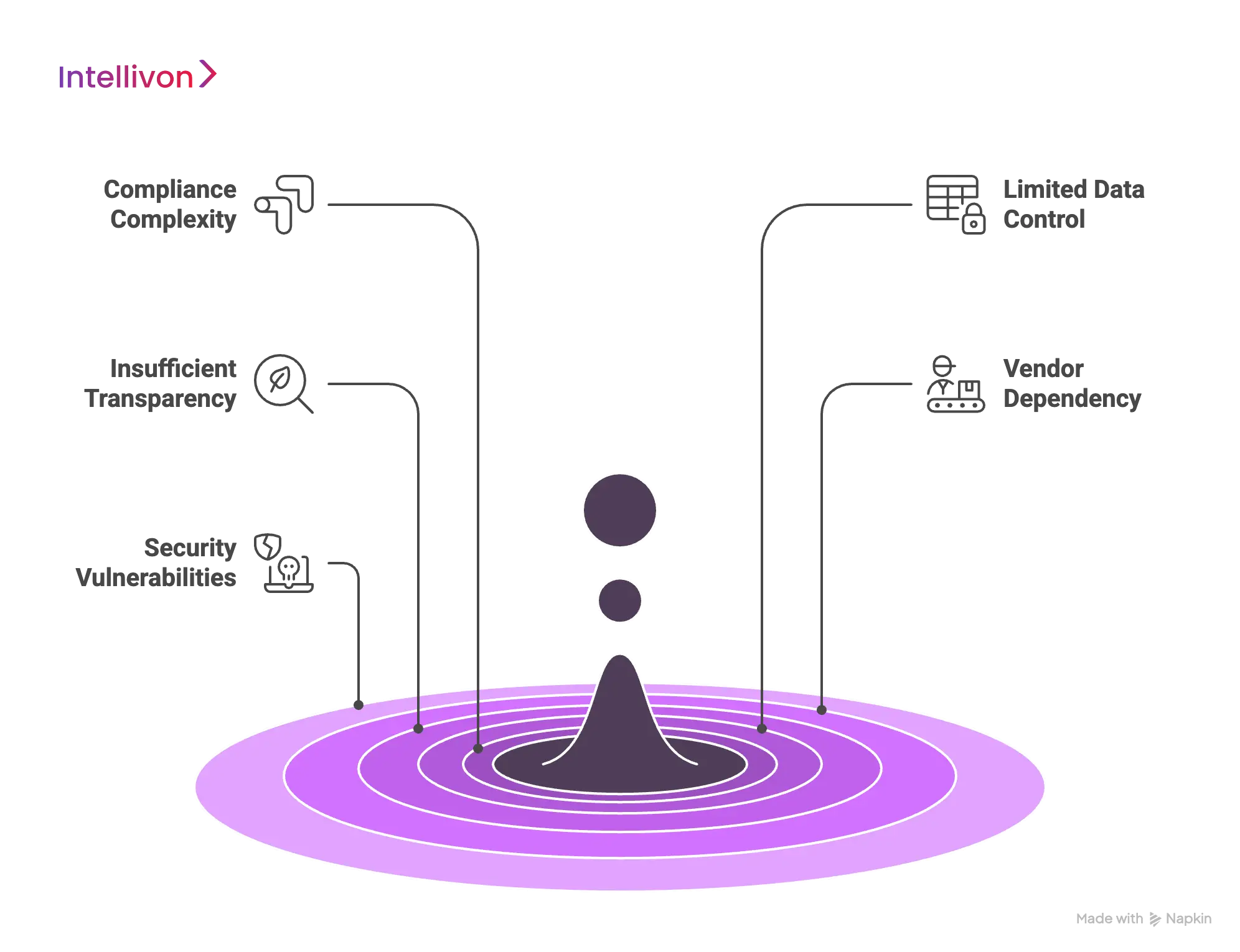
1. Compliance Complexity
Regulated industries are bound by strict laws that often evolve rapidly. Laws such as GDPR , HIPAA, and FINRA require businesses to continuously adapt to changes in regulations.
For example, a financial institution using a SaaS AI solution might find that the platform is slow to adapt to changes in FINRA compliance or updates to SOX (Sarbanes-Oxley Act).
A 2019 survey by PwC found that 63% of companies reported GDPR non-compliance fines due to their inability to quickly adapt to changing laws, with SaaS providers often lagging behind regulatory shifts.
SaaS AI products generally serve a broad market, which means their features are “one-size-fits-most.” This approach makes it difficult for these solutions to fully meet the unique regulatory requirements of different industries or jurisdictions, increasing the risk of non-compliance fines.
2. Limited Data Control
Data control and sovereignty are key concerns for businesses in regulated sectors. SaaS AI platforms primarily operate on multi-tenant public cloud infrastructure, where multiple clients’ data is stored together. This setup can raise serious concerns about data jurisdiction, unauthorized access, and data leaks.
For instance, a healthcare provider using a SaaS AI system might find that their data is stored on servers in another country, violating HIPAA‘s strict data residency rules.
For regulated organizations, relinquishing control over sensitive data is not a risk they can afford. SaaS AI forces businesses to trust vendors with the management of data privacy and security, a dangerous position for companies handling critical or personal data.
3. Insufficient Transparency
Regulatory bodies require that AI systems be auditable and explainable, especially when they’re used for critical processes like fraud detection, loan approvals, or medical diagnoses. SaaS AI platforms often fail to provide the level of transparency needed to satisfy regulators.
For example, a bank using a SaaS AI solution for fraud detection may not be able to fully explain how the system flagged a transaction as suspicious. FINRA requires that financial institutions keep detailed audit trails to demonstrate that decisions made by automated systems are in line with regulatory guidelines. Without clear visibility into the decision-making process, businesses are exposed to regulatory penalties. A 2021 report by Deloitte found that 47% of financial institutions said they struggle with explainability in AI systems, especially when relying on SaaS platforms.
4. Vendor Dependency
SaaS AI solutions create a level of vendor dependency that can be risky for businesses in regulated sectors. Your AI system’s performance and compliance rely entirely on the vendor’s infrastructure and roadmap. If a vendor changes its policies, raises its prices, or discontinues a service, your business could be left vulnerable.
For instance, a financial institution relying on a SaaS AI vendor for fraud detection might face significant disruption if the vendor discontinues a critical feature or increases subscription fees, potentially compromising the regulatory compliance of their system.
This dependency limits strategic autonomy and increases operational risk, especially when the SaaS vendor’s priorities shift or when regulatory compliance requirements become more stringent.
5. Security Vulnerabilities in Shared Environments
Cybercriminals increasingly target SaaS platforms due to the nature of their shared environment. A breach in a multi-tenant cloud could expose sensitive data from multiple organizations.
In 2021, a major data breach affected over 10,000 organizations that used the same cloud-based SaaS platform, including financial firms and healthcare providers.
A 2022 survey by Cybersecurity Hub found that 63% of cybersecurity professionals consider SaaS environments to be a high-security risk, with data breaches and misconfigurations being common vulnerabilities. For regulated industries, these risks are unacceptable, especially when handling personally identifiable information (PII) or protected health information (PHI), which requires strict security protocols.
Why Custom AI Solutions Are Ideal for Enterprises in Regulated Industries
Enterprises operating in regulated industries face challenges that require precision, control, and adaptability from their AI systems, requirements that custom AI solutions satisfy far better than off-the-shelf options. Here’s why custom AI is the ideal choice for businesses in highly regulated environments:
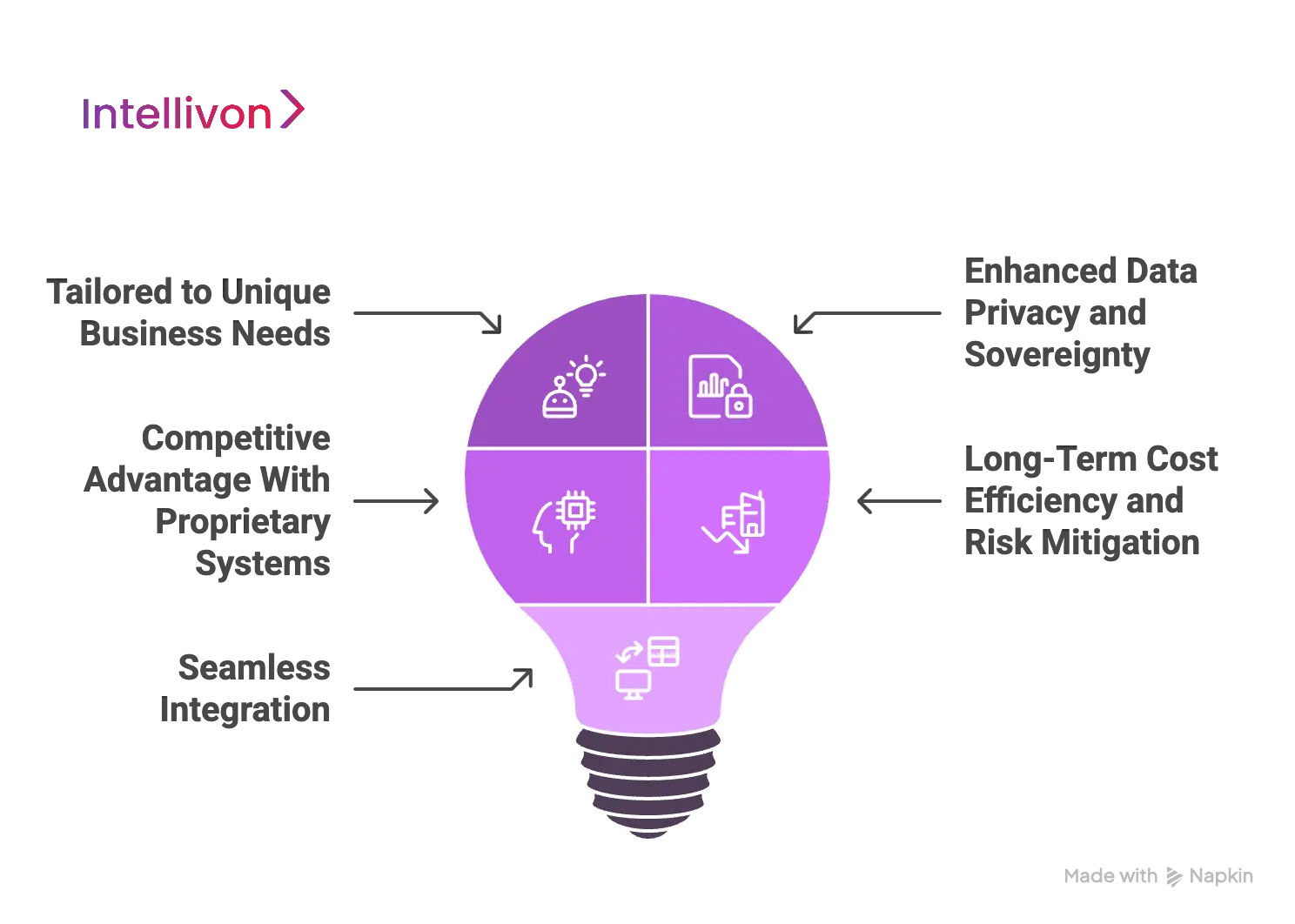
1. Tailored to Unique Business Needs
Regulated industries like healthcare, finance, and legal services operate under strict compliance guidelines that demand AI systems designed specifically for those needs.
Custom AI solutions are built around your organization’s specific workflows, data, and regulatory landscape. For example, a custom AI solution for a healthcare provider can be designed to meet HIPAA regulations, ensuring sensitive patient data is handled securely and compliantly. Custom AI can:
- Address industry-specific regulations like HIPAA, GDPR, FINRA, and SOX with tailored compliance controls.
- Enable fully auditable AI processes that meet regulatory demands for transparency and traceability.
- Adapt quickly to changes in legal requirements and internal policies, reducing the risk of costly non-compliance.
2. Enhanced Data Privacy and Sovereignty
Data privacy is paramount in regulated sectors. Custom AI gives organizations full control over their data, which is essential for maintaining privacy and security.
They can be deployed on-premises or in hybrid environments, meaning organizations maintain direct control over how and where data is stored and processed. For instance, a healthcare organization may choose to store patient data on servers within the United States to comply with HIPAA regulations. This eliminates the risks associated with multi-tenant public cloud environments where organizations may lose control over sensitive data.
3. Competitive Advantage With Proprietary Systems
Custom AI solutions provide a competitive edge by allowing enterprises to develop proprietary systems that set them apart in the market.
With custom-built AI, enterprises own the intellectual property (IP) and models, ensuring that valuable business insights and data stay exclusive. For instance, a bank using custom AI for fraud detection will have a system that is unique to their operations and more effective at minimizing risk. This provides a competitive advantage over others in the market.
4. Long-Term Cost Efficiency and Risk Mitigation
While custom AI solutions require a higher initial investment, they offer superior long-term ROI and risk mitigation.
The upfront cost for custom AI solutions may be higher due to development, implementation, and ongoing optimization. However, the benefits quickly outweigh the costs, as custom AI systems automate compliance tasks, reduce operational errors, and minimize the risk of costly regulatory fines. For example, by automating audit processes, a custom AI system can save countless hours of manual work, improving both efficiency and compliance.
Investing in custom AI ensures that compliance, security, and operational effectiveness are deeply embedded in your AI strategy, making it the best path forward for sustainable growth and competitive success.
5. Seamless Integration
Custom AI solutions are designed with flexibility in mind, making it easy to integrate with your organization’s legacy systems without disrupting existing operations.
Unlike off-the-shelf AI solutions that may require significant changes to your existing infrastructure, custom AI can be built to seamlessly integrate with your current systems.
For example, a custom AI solution for a financial institution can work alongside existing core banking software or integrate with established customer relationship management (CRM) systems, all while ensuring that the workflow remains uninterrupted.
Legacy systems often have specific requirements or constraints that off-the-shelf solutions can’t accommodate, but a custom AI solution is crafted with these limitations in mind, ensuring that the AI seamlessly complements existing tools.
Real-World Applications: Use Cases in Regulated Industries
Tailored AI solutions help businesses optimize processes, enhance customer experiences, and ensure regulatory adherence. In this section, we’ll explore how custom AI is being applied across various sectors, from fraud detection in finance to predictive maintenance in energy, highlighting the tangible benefits of AI in these highly regulated environments.
1. Banking & FinTech
In banking and financial services, custom AI systems streamline operations, improve security, and enhance customer service.
- Account Management and Transaction Support: Custom AI chatbots assist customers with managing accounts and transactions. These systems provide 24/7 support without human intervention, improving response times and customer satisfaction.
- Loan and Credit Application Processing: AI can guide customers through the loan process, helping them complete applications and submit required documents with ease.
- Fraud Prevention and Customer Alerts: Real-time AI detects fraud and sends alerts to customers, preventing unauthorized transactions and enhancing security.
Example: Discover Financial (Discover Virtual Assistant)
Discover Financial uses Discover Virtual Assistant to help customers manage accounts. This custom AI solution automates routine queries, improves service efficiency, and ensures compliance. By handling simple interactions, it allows human agents to focus on more complex issues.
2. Healthcare
In healthcare, custom AI is improving patient care, ensuring regulatory compliance, and enhancing operational efficiency.
- Medical Diagnosis and Imaging: AI analyzes medical images to detect conditions like tumors or fractures, helping doctors make faster and more accurate diagnoses.
- Patient Data Management and Compliance: AI ensures healthcare organizations manage patient data in compliance with HIPAA regulations, detecting potential security risks and automating compliance checks.
- Personalized Treatment Plans: Custom AI uses patient data to recommend personalized treatments, improving patient outcomes by tailoring care to individual needs.
Example: Mayo Clinic (AI for Imaging and Diagnosis)
Mayo Clinic uses AI to analyze medical images for faster, more accurate diagnoses. Their custom AI ensures compliance with HIPAA and improves patient care by identifying conditions that might be overlooked.
3. InsurTech
Custom AI is revolutionizing the insurance industry by streamlining claims processing, improving risk assessment, and enhancing customer engagement.
- Claims Automation: AI automates the claims process, reducing the time required to assess, approve, and pay claims. This leads to faster service and fewer human errors.
- Fraud Detection and Risk Assessment: Custom AI analyzes historical data to detect fraudulent claims and assess risk, improving both security and operational efficiency.
- Personalized Policy Recommendations
AI provides customers with tailored insurance policy options based on individual risk profiles and needs.
Example: Progressive Insurance (AI for Claims Processing)
Progressive Insurance uses custom AI to automate claims processing. This speeds up the approval process, reduces errors, and enhances fraud detection, ensuring the company remains compliant with industry regulations.
4. LegalTech
In the legal field, custom AI systems streamline document review, compliance monitoring, and legal research.
- Contract Review and Analysis: AI helps lawyers quickly review contracts, identifying key clauses, potential risks, and inconsistencies that may be missed in manual reviews.
- Regulatory Compliance Monitoring: AI monitors changes in regulations and ensures that legal teams stay up to date, minimizing compliance risks.
- Litigation Support: AI identifies relevant case precedents, legal documents, and data points, speeding up the research process and improving case strategies.
Example: Luminance (AI for Document Review)
Luminance uses custom AI to help law firms review contracts. Their AI analyzes documents, detects risks, and ensures compliance with regulations like GDPR, improving efficiency and reducing human error.
5. Energy and Utilities
In energy and utilities, custom AI systems optimize operations, monitor compliance, and improve safety.
- Predictive Maintenance: AI monitors equipment and predicts when maintenance is needed, reducing downtime and avoiding costly repairs.
- Energy Management and Optimization: AI optimizes energy distribution, ensuring that resources are used efficiently and reducing waste.
- Environmental Compliance Monitoring: AI helps track emissions and environmental impact, ensuring companies stay within regulatory limits and avoid penalties.
Example: ExxonMobil (AI for Predictive Maintenance)
ExxonMobil uses custom AI to monitor equipment in their facilities. The system predicts failures before they happen, preventing costly downtime and ensuring compliance with environmental regulations.
Our Step-By-Step Process of Building Custom AI Solutions For Your Enterprise
At Intellivon, we specialize in creating custom enterprise AI solutions tailored to the specific needs of enterprises in regulated industries. With over 500 successful AI deployments, we have honed a proven, step-by-step process that ensures your AI systems are tailored to meet your business needs while strictly adhering to industry regulations. Here’s how we work with you to build the perfect AI solution for your enterprise.
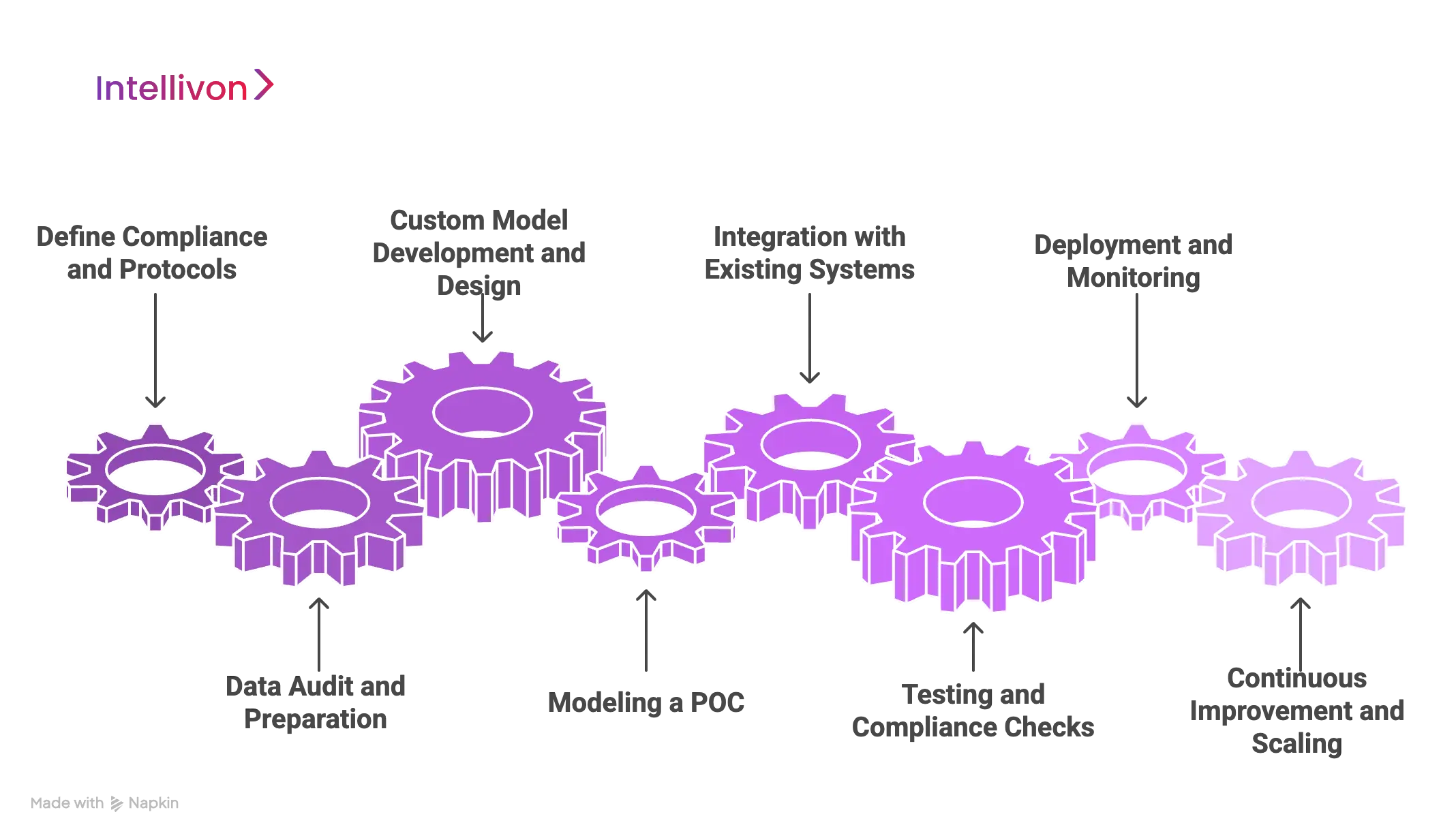
1. Defining Clear Compliance and Protocols
Compliance is at the heart of AI development for regulated industries, so we immediately address your compliance needs. Based on your industry’s regulations, we incorporate strict security measures and compliance protocols into the design of the AI system.
We also define how data will be accessed, processed, and stored to ensure the solution respects both data sovereignty and security requirements. This proactive approach helps mitigate risks right from the start.
2. Data Audit and Preparation
Before developing any AI model, we conduct a comprehensive audit of your data. This is crucial because the quality of the data used directly impacts the performance of the AI system.
During this phase, we examine whether your existing data is complete, clean, and compliant with the necessary regulations. If needed, we assist in data cleaning to ensure that the information is accurate, relevant, and usable for training the AI model.
3. Custom Model Development and Design
With the data in place, we begin developing a custom AI model specifically designed for your needs, tailored to the exact problem your business is facing.
Custom AI models are built with your industry’s regulations and your business’s operational requirements in mind. We don’t use generic models. Instead, we design a system that’s flexible and capable of adapting to your existing workflow, making sure that it delivers highly relevant and accurate outcomes.
4. Modeling a POC
Before moving forward with full deployment, we develop a Proof of Concept (POC) to validate the AI model’s performance in real-world scenarios. The POC serves as a pilot phase where we test the solution’s ability to meet your operational requirements and compliance needs.
During this phase, we collect feedback, fine-tune the system, and ensure the AI solution delivers the desired outcomes. We also ensure that the solution can scale as your business grows and that it aligns with evolving regulations.
5. Integration with Existing Systems
Integrating custom AI solutions with your current systems is a key part of the process. We don’t believe in disrupting your existing workflows or infrastructure. Whether you have legacy systems, a CRM, or ERP tools, our team works to ensure the AI system integrates seamlessly without causing downtime or disruption.
For instance, in healthcare, we ensure that AI systems fit within your existing electronic health record (EHR) systems, allowing for smooth communication between platforms while maintaining HIPAA compliance. This integration makes sure that your new AI solution becomes a natural extension of your business rather than an isolated tool.
6. Testing and Compliance Checks
Testing is a critical step where we ensure that your AI solution is robust, secure, and compliant. We conduct extensive performance testing to check how well the AI system handles real-world data, ensuring it’s accurate and efficient.
Simultaneously, we run regulatory compliance checks to confirm that the AI system adheres to all industry-specific requirements.
For example, in the insurance sector, we ensure that all claims automation processes meet state and federal regulations. This testing phase is about ensuring that everything, from data security to decision-making transparency, is fully compliant and ready for deployment.
7. Deployment and Monitoring
Once the AI system passes testing, we deploy it into your operational environment. The deployment is carefully managed to ensure minimal disruption. After going live, we continuously monitor the AI system’s performance and compliance in real-time.
We track its effectiveness and ensure that it’s still aligned with regulatory updates and changes.
8. Continuous Improvement and Scaling
AI is not a set-it-and-forget-it solution. As regulations evolve, so too must your AI system. We work with you to continuously improve the solution by incorporating feedback, optimizing performance, and scaling as your business grows.
Our team monitors both operational efficiency and compliance performance, ensuring that the AI solution continues to meet your needs and regulatory standards over time. If your business expands, we ensure that the system can scale seamlessly while maintaining the same level of precision, accuracy, and compliance.
By partnering with Intellivon, you gain a trusted advisor capable of developing custom AI systems that drive innovation, enhance operational efficiency, and ensure full regulatory compliance. Book your strategy call today and get a free audit done by our AI engineers.
Tools and Technology We Use To Deliver Scalable AI Solutions For Regulated Enterprises
At Intellivon, we utilize our arsenal of advanced tools and technologies to create scalable, secure, and compliant AI solutions for regulated enterprises. Below is an overview of the tools and technologies we rely on to deliver world-class AI solutions:
1. Governance-First AI Platforms
We use AI platforms that are designed with compliance and governance built-in, ensuring transparency, traceability, and security from the ground up. These platforms support:
- IBM Watsonx: Offers robust data lineage tracking and governance tools, ensuring model traceability and auditability, which are essential for regulated industries like healthcare and finance.
- Google Cloud AI Platform: Provides powerful tools for AI governance, including model tracking and built-in compliance features, helping businesses stay aligned with GDPR and other regulatory standards.
- Microsoft Azure AI: Known for its strong data governance capabilities, this platform enables compliance with industry regulations like HIPAA, SOC 2, and GDPR.
These governance-first platforms ensure that every decision made by AI can be easily traced, audited, and adjusted to meet regulatory requirements.
2. Integration with Core Enterprise Systems
Our custom AI solutions are designed to integrate seamlessly with your existing infrastructure, including ERP, CRM, and MES. Key tools for integration include:
- Apache Kafka: A distributed streaming platform that ensures real-time data integration between AI models and enterprise systems, supporting AML checks and other compliance workflows.
- MuleSoft: Provides an API-led integration framework to connect AI models with core business systems like ERP, CRM, and legacy platforms, ensuring seamless data flow and regulatory compliance.
- Fivetran: A fully managed data pipeline tool that integrates data from multiple sources, preparing it for real-time AI processing while ensuring compliance with data sovereignty and privacy regulations.
These tools allow us to ensure that your AI solutions work smoothly with your existing business infrastructure, supporting seamless and compliant operations.
3. AI and Data Compliance Frameworks
Ensuring compliance across the entire AI lifecycle is critical. We use the following tools to create AI solutions that are always aligned with regulatory requirements:
- OneTrust: A privacy management platform that helps track consent, data access, and compliance with privacy regulations like GDPR and CCPA.
- Collibra: A data governance platform that ensures data used in AI models adheres to privacy laws and industry regulations, helping teams stay on top of compliance requirements.
- TrustArc: Provides automated compliance solutions for managing privacy risks and ensuring data is handled in compliance with global regulations like GDPR and HIPAA.
These frameworks allow us to automate compliance tasks, ensuring AI systems continue to meet regulatory standards and can easily adapt to changing legal requirements.
4. Advanced Analytics and Semantic Search
To extract meaningful insights from complex data sets, we use semantic search engines and advanced analytics tools, ensuring compliance is maintained. Key tools include:
- Squirro: A knowledge management platform that uses AI to combine semantic search with contextual intelligence, helping businesses in regulated industries like finance and defense analyze large data sets while ensuring compliance with data sovereignty and privacy regulations.
- ElasticSearch: An AI-enhanced search engine that provides real-time search capabilities and data exploration, while ensuring compliance with data privacy standards.
- Microsoft Azure Cognitive Search: A semantic search platform that leverages AI and NLP to provide deeper insights into unstructured data, supporting data privacy and regulatory controls.
These tools help businesses gain valuable insights from complex datasets while ensuring all regulatory and compliance requirements are met.
5. Custom AI Model Development
We build custom AI models tailored to your business needs. These models are trained using the following tools, allowing us to ensure accuracy and compliance:
- TensorFlow: An open-source deep learning framework used to develop and train complex models, including those for image recognition, predictive analytics, and NLP tasks.
- PyTorch: A flexible machine learning framework ideal for developing and training AI models for research, prototyping, and production applications in regulated industries.
- Apache Airflow: An orchestration platform for automating workflows and data pipelines, ensuring continuous monitoring and compliance throughout the AI lifecycle.
These tools allow us to create AI models that are highly specific to your industry and can evolve with your regulatory and business needs.
6. Collaboration and Workflow Optimization Tools
To ensure smooth collaboration and workflow optimization, we incorporate AI-driven tools like:
- Asana AI: An AI-enhanced project management tool that helps teams track tasks, automate workflow processes, and ensure that regulatory compliance requirements are met at every stage of the project.
- Miro AI: A collaborative platform for brainstorming and visualizing projects, using AI to enhance team collaboration and speed up decision-making while ensuring compliance in the process.
- Trello AI: A task management tool that uses AI to help organize projects and workflows, ensuring that all compliance requirements are integrated into the process, reducing human error and ensuring smooth task execution.
These tools enhance cross-team coordination, project planning, and workflow management while ensuring that AI solutions are built in compliance with industry standards.
7. Real-Time Monitoring and Compliance
After deployment, continuous monitoring is crucial to ensure that AI systems remain compliant. We rely on the following tools to provide real-time monitoring and compliance reporting:
- Dynatrace: An AI-driven monitoring tool that tracks system performance and compliance, providing insights into potential regulatory risks or system failures in real time.
- Splunk: A data analysis platform that provides real-time monitoring and security, ensuring that AI systems are functioning optimally while adhering to compliance standards.
- Alteryx: A platform for data analytics and automated reporting, helping us generate compliance reports quickly and easily to ensure your AI system meets the latest regulatory standards.
These monitoring and reporting tools ensure that your AI solution stays on track and fully compliant throughout its lifecycle.
The Future of AI in Regulated Industry Enterprises
As AI continues to advance, we can expect a shift from simple risk detection to decision intelligence, a more sophisticated approach that empowers enterprises to act with confidence in a rapidly changing regulatory environment.
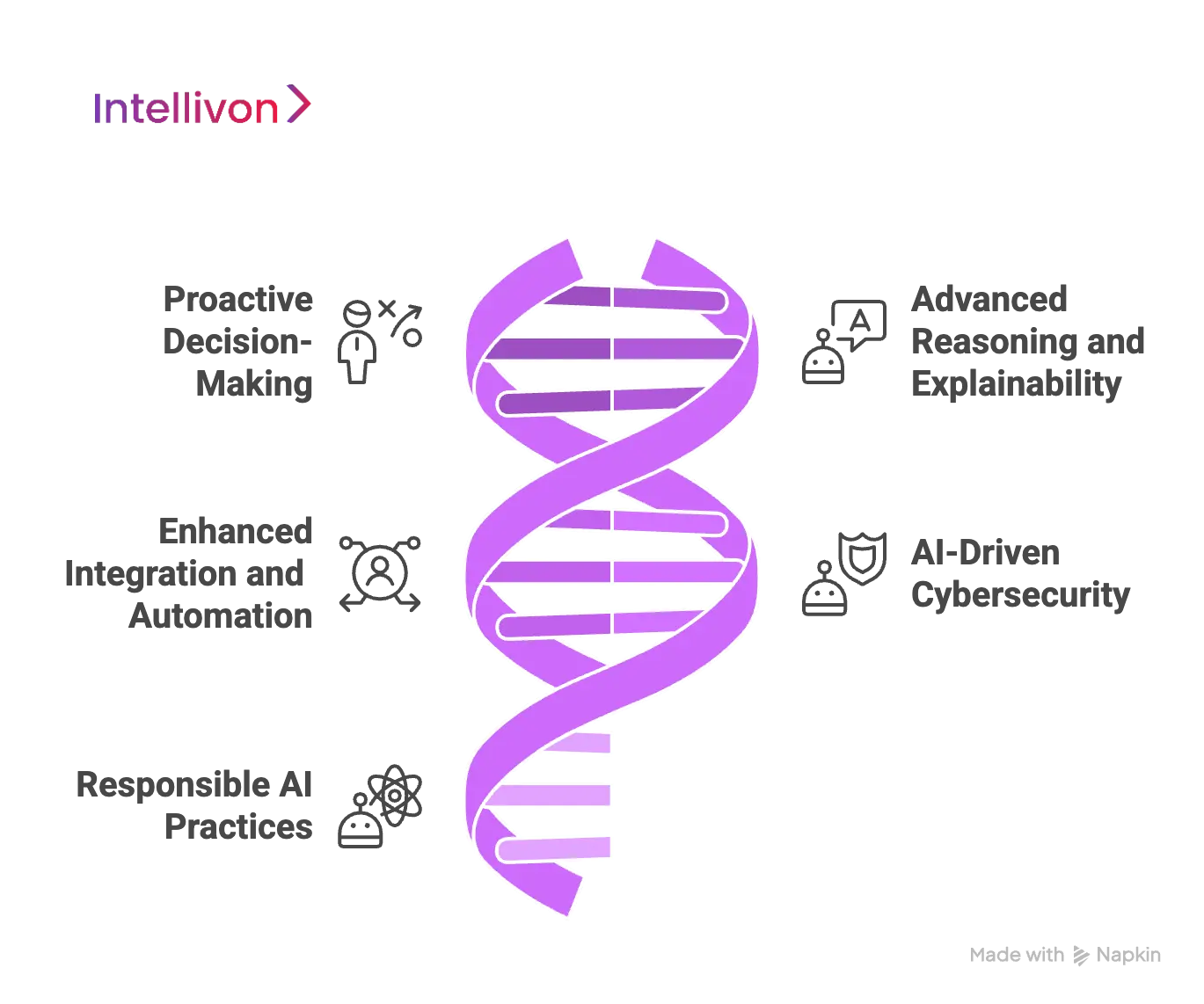
1. Proactive Decision-Making
AI is shifting toward a decision intelligence model, which means AI systems will not only identify compliance risks but will also provide actionable recommendations to mitigate these risks.
For example, an AI system could not only flag suspicious transactions for anti-money laundering (AML) violations but also recommend the necessary steps for immediate action, such as notifying regulatory bodies or freezing accounts.
2. Advanced Reasoning and Explainability
Future AI models, particularly large language models (LLMs) like GPT-4 and others, will be able to not only detect issues but also offer structured reasoning behind their decisions.
For example, an AI model used for credit scoring in financial services will not just return a credit score; it will also explain the rationale behind the decision based on the data it has analyzed.
3. Enhanced Integration and Automation
Tasks like AML checks, Know Your Customer (KYC) verifications, and audit reporting will be handled seamlessly in real-time, reducing the need for manual interventions.
For instance, AI can now run continuous AML checks during financial transactions, identifying and flagging potentially suspicious activity instantly.
4. AI-Driven Cybersecurity
As businesses shift towards digital platforms, concerns about data security and data sovereignty grow. With on-premises or hybrid deployments, AI is becoming a key player in securing sensitive data and ensuring compliance with jurisdictional regulations.
AI-driven smart cybersecurity systems will play a crucial role in protecting against data breaches and unauthorized access. By leveraging AI, businesses can continuously monitor for security threats and respond in real-time.
5. Responsible AI Practices
As AI becomes more embedded in everyday business operations, the importance of responsible AI practices grows. Therefore, it’s critical for businesses to adopt fairness, privacy, explainability, and ethical AI practices.
The future of AI will require businesses to implement ethical governance frameworks that prioritize transparency and accountability.
How Intellivon Plans to Stay Ahead of Evolving Regulatory Standards
As AI continues to evolve, we are committed to staying ahead of emerging regulations and offering next-gen solutions that keep our clients compliant, secure, and agile. Our strategy includes:
- Continuous monitoring of regulatory changes: We actively track shifts in laws and industry standards to ensure that our AI solutions are always compliant.
- Leveraging AI for compliance updates: By building AI systems capable of automatically adapting to new regulations, we ensure that businesses are always operating within legal boundaries.
- Investing in responsible AI: We are committed to developing AI that is ethical, fair, and explainable, ensuring that AI decisions are transparent and accountable.
- Collaborating with regulatory bodies: We work closely with regulators to understand their needs and expectations, ensuring that our AI systems continue to meet the highest standards of compliance.
Conclusion
Choosing between SaaS AI and Custom AI for your regulated business comes down to balancing cost, scalability, and compliance needs.
While SaaS AI offers quicker deployment and lower upfront costs, Custom AI delivers greater control, adaptability, and long-term regulatory compliance.
For enterprises in highly regulated sectors, investing in custom AI may be the more secure and sustainable choice, ensuring a tailored, future-proof solution.
Why Intellivon is Your Strategic Partner for Custom AI Success
With over 11 years of experience in AI for regulated industries and 500+ successful custom AI implementations, Intellivon is your trusted partner in building tailored AI solutions. From automating compliance workflows to providing actionable insights for risk management, we help enterprises transform complex regulatory challenges into operational advantages.
Why Choose Intellivon for Your Custom AI Solution?
- Tailored AI Models for Compliance: We design AI systems specifically for your industry’s unique regulatory needs, ensuring your solution is compliant and adaptable.
- Seamless Integration with Existing Systems: Our custom AI models integrate smoothly with your ERP, CRM, and legacy systems, ensuring data sovereignty and operational efficiency.
- Long-Term ROI Commitment: Our custom AI solutions are designed to deliver tangible business outcomes. We help you streamline processes, reduce manual errors, and enhance decision-making, all while ensuring regulatory adherence.
Want to future-proof your enterprise with compliant, scalable custom AI solutions? Let’s build the right AI strategy for your business.
Book a discovery call with our AI consultants today and get:
- A comprehensive audit of your AI readiness and regulatory needs
- A tailored AI compliance roadmap for your industry
- A detailed implementation plan with an ROI forecast
FAQ’s
1. What is the difference between SaaS AI and Custom AI for regulated industries?
SaaS AI is a general, ready-made solution designed for a broad market. It may not meet the specific needs of regulated industries, especially when it comes to compliance and data security. Custom AI, on the other hand, is tailored to fit the unique requirements of your business, ensuring full control over data privacy, security, and regulatory compliance.
2. How can Custom AI help my business stay compliant with regulations?
Custom AI can be built to meet the specific regulatory requirements of your industry, such as HIPAA, GDPR, and SOX. These solutions are adaptable and can automatically update as regulations change, ensuring your business remains compliant without requiring manual intervention.
3. What benefits does Custom AI provide to regulated industries like healthcare and finance?
Custom AI solutions offer benefits like automation of complex compliance workflows, better data privacy control, and enhanced decision-making capabilities. They ensure that businesses in regulated industries can operate more efficiently while maintaining full compliance with the strictest regulatory standards.
4. How does Custom AI improve decision-making in regulated industries?
Custom AI models process large amounts of data to provide accurate, actionable insights, which helps businesses make informed, data-driven decisions. By automating key processes, AI can also ensure that decisions align with industry regulations, reducing the risk of human error.
5. How do you ensure data security in Custom AI solutions?
Custom AI solutions come with built-in security features, such as end-to-end encryption, data sovereignty controls, and fine-grained access management. These measures ensure that your sensitive data is protected, whether your solution is deployed on-premises or in a hybrid environment, complying with local and global data privacy laws.

